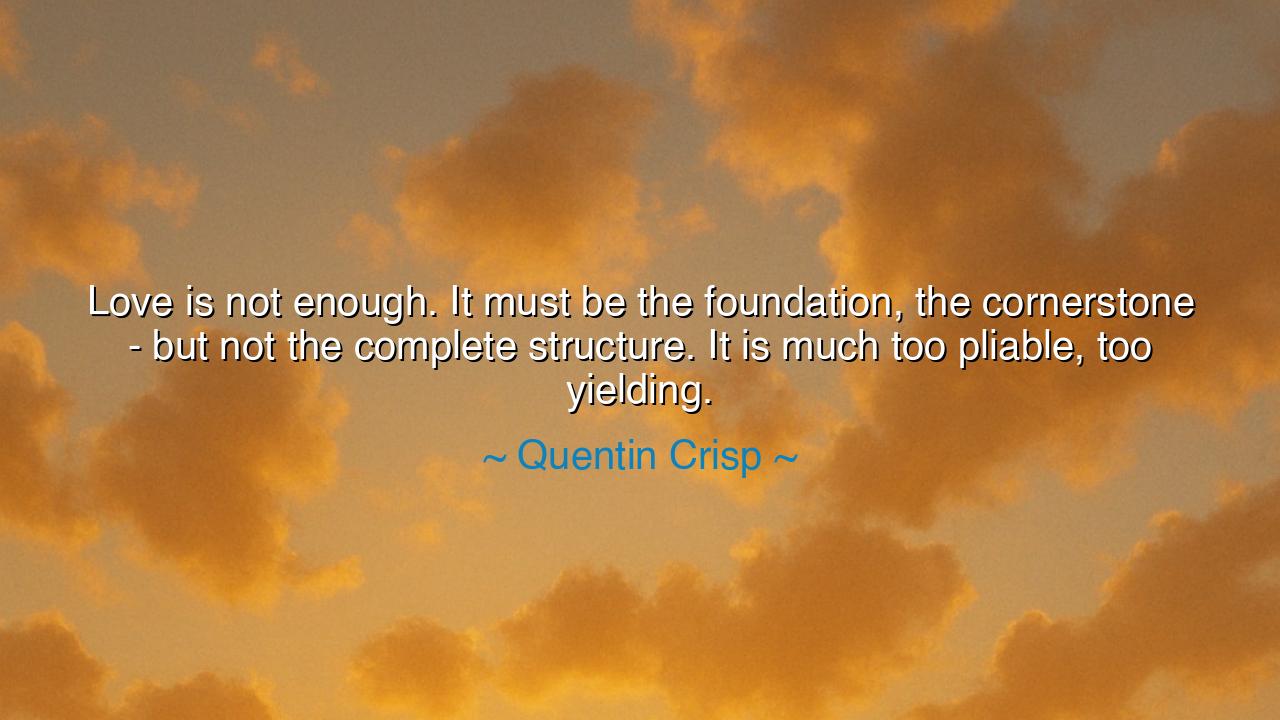
Love is not enough. It must be the foundation, the cornerstone -
Love is not enough. It must be the foundation, the cornerstone - but not the complete structure. It is much too pliable, too yielding.






In his sharp wit and worldly wisdom, Quentin Crisp, a man who knew both the beauty and the burden of love, once declared: “Love is not enough. It must be the foundation, the cornerstone — but not the complete structure. It is much too pliable, too yielding.” These words, though spoken in the modern age, carry the weight of an ancient truth. For love, though divine in spark, is fragile when left alone. It is the foundation upon which we build our lives and our relationships, but without strength, discipline, and structure, even the most passionate love can crumble beneath the pressures of time.
Crisp, known for his honesty and eccentric grace, was not condemning love, but revealing its deeper nature. He understood that love, by itself, is tender — pliable, as he says — and like water, it nourishes but cannot stand upright without form. Love can inspire, uplift, and awaken the soul, yet it can also blind, distort, and falter when unaccompanied by wisdom, respect, and responsibility. To love is easy; to sustain love, to build a life around it, demands the architecture of the spirit — pillars of trust, walls of patience, and a roof of mutual understanding. Love must be the beginning, but not the end.
The origin of Crisp’s insight lies in his own life, a life marked by both defiance and solitude. As a man who lived openly in a world that often rejected him, he saw the ways people used love as both shield and illusion. He learned that affection without integrity dissolves into dependency, and passion without respect withers into pain. From his own heartbreaks, he understood that love, though powerful, cannot bear the full weight of human frailty alone. It must be shaped, supported, and strengthened — lest it become what he called “too yielding,” bending under the strain of reality’s storms.
The ancients, too, spoke of this truth in their own ways. Plato, in his dialogues, wrote of love not as the final goal but as the first step toward divine wisdom — a force that draws the soul upward, teaching it to seek beauty not only in the beloved, but in truth itself. And in the East, the sages of India taught that love must be joined with dharma — the sacred duty of righteousness — if it is to endure. The great loves of history, from Antony and Cleopatra to Tristan and Isolde, burned brightly yet perished, for they were built on passion without the discipline of balance. Love without structure is a fire untended — fierce in its moment, but destined to consume itself.
To build the structure of love is to recognize that affection alone does not make harmony. Love must be joined with honor, with the willingness to listen, to compromise, to forgive. It must stand on the foundation of shared purpose and aligned values. In every enduring bond — be it between lovers, friends, or families — there exists more than sentiment. There is work, constancy, and sacrifice. The builder who lays only the cornerstone but never raises the walls leaves his home open to the wind. So too, the lover who feels deeply but never labors to understand will one day find that love alone cannot shelter them from the storms of life.
Consider the story of Eleanor Roosevelt, who lived in a marriage often strained and complex, yet one that endured through partnership, respect, and shared mission. Her love for Franklin was not blind devotion, but a deeper, mature affection — one that understood the difference between emotion and purpose. Their bond became a structure built upon service, loyalty, and resilience. Love was their cornerstone, but their shared vision — their commitment to humanity — was the structure that made their connection unbreakable. From this, we learn that love, when coupled with integrity and mutual purpose, becomes something eternal.
And so, dear listener, take this wisdom into your own heart: do not worship love as a god, but honor it as a gift. Build upon it with truth, with kindness, with steadfastness. When you love, let your feelings be deep, but let your actions be deeper still. For love is not a finished temple — it is the stone laid at dawn, waiting for the builder’s hands. It will guide you, it will sustain you, but it will also test you — and in that testing, it will reveal who you truly are.
In the end, Quentin Crisp’s words remind us that love is not weakened by admitting it needs more — it is strengthened. The purest love does not demand perfection, but partnership; it does not fade when hardship comes, but calls forth courage. Let love be your foundation, but build upon it with wisdom. Then your heart’s house will stand — not for a season, but for all the ages to come.






AAdministratorAdministrator
Welcome, honored guests. Please leave a comment, we will respond soon